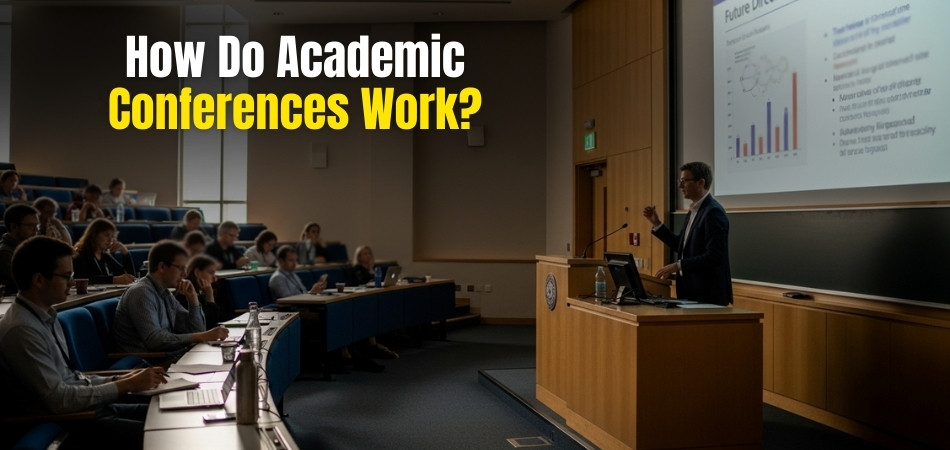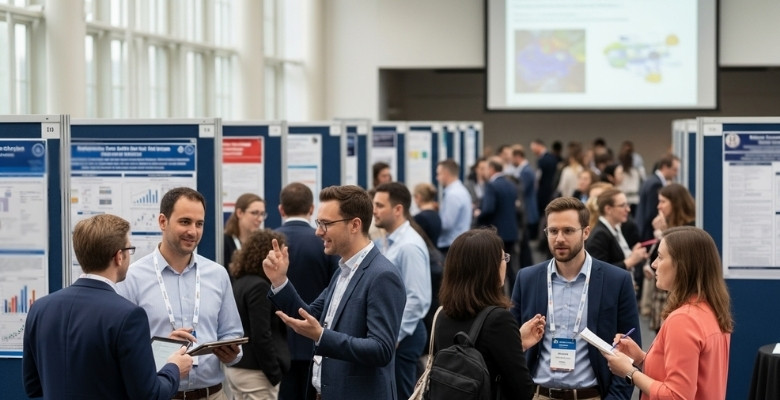Academic conferences are meetings where people come together to share new ideas and research. They can happen in person, online, or both. In these events, you’ll find speeches, short talks, group discussions, and even posters that explain studies. They give everyone a chance to learn new things and meet others.
So, how do academic conferences work?
Academic conferences work by bringing researchers together to share ideas and studies. People send in their research papers first. If accepted, they give short talks or show posters. Sessions include speeches, group talks, and workshops. These events can happen in person, online, or both, and help people learn and meet others in their field.
Keep reading to understand more about how these conferences really work.
How Do Academic Conferences Work?
Academic conferences are events where researchers share ideas, present studies, and learn from others. These events include short talks, poster sessions, group discussions, and workshops that make learning active and interesting.
Conferences can be in person, online, or hybrid, so people worldwide can join without much difficulty. Keynote speakers and panels also give participants valuable insights into new topics and research trends.
The process starts with a call for papers, and researchers submit abstracts or full studies for review. Accepted works are then presented through short talks, posters, or workshops, giving many chances to share knowledge.
Attending conferences helps people build networks, get feedback, and explore new ideas for future projects. Countries like Canada, Germany, and Japan host major gatherings, with upcoming conferences in Canada drawing strong global participation.
The key components of an academic conference include:
- Call for Papers (CfP): The starting point where the conference theme, submission guidelines, deadlines, and types of accepted presentations (e.g., full papers, posters) are announced. This invites researchers to submit their work for review.
- Conference Sessions:
- Plenary Sessions: Sessions for all attendees, often including keynote speeches by prominent scholars.
- Keynote Sessions: Major presentations setting the tone and theme of the conference.
- Panel Sessions: Multiple experts discuss or debate a specific topic.
- Oral Sessions: Presentations by several researchers around common themes with Q&A.
- Poster Sessions: Visual displays of research for detailed one-on-one discussions.
- Workshops: Tutorials or training sessions, often for early-career researchers.
- Roundtable Discussions: Informal small group discussions on focused topics.
- Symposia: Thematic sessions with related presentations reviewed as a group.
- Lightning Talks: Very short presentations, typically 5-10 minutes.
- Submission and Review Process: Submitted abstracts or papers undergo peer review for academic merit, relevance, and originality before acceptance.
- Conference Program: A curated schedule balancing different types of sessions, parallel streams, and breaks to engage attendees effectively.
- Publication: Accepted work is often published as conference proceedings or collected papers.
- Networking Opportunities: Social events, breaks, and informal gatherings to foster collaboration and academic exchange.
How Can You Prepare Effectively for an Academic Conference?
Attending an academic conference can feel exciting but also overwhelming without the right plan. Preparation is the key to making the most of your time, whether you are presenting research, networking, or learning. Here’s how you can prepare effectively and walk in with confidence.
Step 1: Set Your Goals
Decide why you will attend and write those aims in simple words. Maybe you want feedback, fresh ideas, or new contacts. Choose one main goal and two smaller goals to keep focus. Review them before each choice you make.
Step 2: Study the Event
Read the theme, schedule, speakers, and venue details with care. Mark sessions that match your interests and skills. Check the map and notes so you avoid last-minute stress. Confirm registration rules and any deadlines.
Step 3: Build Your Presentation
Outline your story first, then design slides that show one idea per screen. Practice out loud and time each part for smooth delivery. Use clear charts, and, when you present a poster, create memorable conference posters with simple layouts and bold titles. Ask a friend to review and give honest advice.
Step 4: Plan Travel and Costs
Book flights, trains, or buses early to save money. Reserve a hotel near the venue for easy mornings. Arrange visas and insurance if you need them. Keep all receipts in one folder for quick access.
Step 5: Curate Your Schedule
Pick must-see keynotes, high-value papers, and practical workshops. Leave short gaps for breaks and hallway chats. Add backup sessions in case rooms fill up fast. Sync everything to your phone calendar.
Step 6: Prep Your Networking Kit
Write a short intro that explains who you are and what you study. Bring cards or a simple contact link. Prepare two questions for each session you will attend. Practice a warm greeting and a clear handshake.
Step 7: Pack Tech and Files
Charge your laptop, phone, and clicker the night before. Save slides, posters, and PDFs in the cloud and on a USB. Carry adapters, markers, and tape for quick fixes. Test everything again in your hotel room.
Step 8: Engage During Sessions
Arrive early, sit near the front, and focus. Ask short questions that invite helpful answers and friendly dialogue. Share thoughts with neighbors and swap contacts after talks. Post a few takeaways on professional platforms.
Step 9: Follow Up and Reflect
Send thank-you notes within two days and include promised files. Add new contacts to your list and tag their interests. Write a short recap of lessons and next steps. Plan one action that moves your project forward.
The Different Formats of Academic Conferences
Conferences can seem big and confusing, but they are simply gatherings where people come together to learn. Different events use different styles to share ideas, making each one unique and interesting for those who attend. Some formats are big and formal, while others are small and easygoing, but all help people connect. Here are the formats of academic conferences to help you choose the right one.
Research Conferences
These conferences are mostly about sharing new studies and ideas in an organized way. People often give short talks, present papers, or use posters to explain their findings. Panels with experts are also common, giving more depth to the topics discussed. This format is helpful for anyone who wants to show their work and learn about current research.
Symposiums
A symposium is a smaller event that focuses on one very specific topic. Experts gather to explore it in detail, often with fewer distractions compared to larger conferences. This style allows for deeper conversations and more thoughtful exchanges of ideas. It’s a good choice if you want to connect with people who share the same interests.
Workshops
Workshops are interactive sessions that focus on practice as much as theory. Instead of only listening, participants take part in exercises or activities that teach new skills. They can cover methods, tools, or strategies related to academic fields. This makes workshops a good option for people who enjoy learning by doing rather than only listening.
Roundtable Conferences
Roundtables are built around open discussions where everyone is encouraged to join in. A group sits together and focuses on one topic, allowing many voices to be heard. This type of format highlights different perspectives, which makes the conversation richer. It’s a more casual style that helps people feel included and valued.
Seminars
Seminars are small events that feel more like an extended class than a conference. An expert usually gives a lecture on one subject, and then the audience asks questions. This creates a balance of teaching and interaction within a focused setting. It’s a useful format if you want to learn about one topic in depth.
Panel Discussions
Panel discussions bring several experts together to talk about one subject in front of an audience. A moderator usually guides the talk and asks questions to keep things clear and engaging. Different points of view make the conversation lively and informative. The audience often gets the chance to join by asking their own questions.
Colloquiums
Colloquiums are informal events where people present early research or ideas still in progress. The aim is not to show finished work but to get feedback and spark discussion. Attendees share advice or suggestions to help improve the project. This format is helpful for researchers who want to test ideas before publishing.
Poster Sessions
Poster sessions display research on large boards or posters in a shared space. Presenters stand next to their posters and explain their studies when people stop to ask questions. Attendees walk around at their own pace, making it less formal. It’s a great way to have simple one-on-one conversations with researchers.
Virtual Conferences
Virtual conferences happen online using video platforms and chat tools. People can attend talks, workshops, or discussions from their homes without needing to travel. Many events also record the sessions, so you can watch them later if you miss them live. This format makes it easier for participants from different countries to join.
Hybrid Conferences
Hybrid conferences combine in-person and online formats, giving people the choice to attend either way. Some join in the actual venue, while others connect through video platforms. This flexibility makes conferences more inclusive for those who cannot travel. It’s a good option if organizers want to reach both local and global audiences.
Why Are Academic Conferences Important for Researchers?
Academic conferences give researchers special chances to share ideas, grow their work, and meet experts. These events also create platforms where studies gain attention and useful feedback. By joining, researchers improve their knowledge and build stronger professional connections that often last. Here are the main reasons academic conferences play such an important role for researchers:
Sharing New Work
- Researchers show their latest studies through talks, posters, or panels, and audiences respond with questions and thoughts.
- New findings gain visibility in front of experts who can share suggestions that may improve the research further.
- Presenters get valuable recognition for their efforts, and this often helps open doors for future opportunities.
Networking Opportunities
- Conferences gather people with shared interests, giving plenty of time to meet, talk, and create professional contacts.
- Researchers introduce themselves to experts, exchange cards, and begin discussions that can become longer partnerships later.
- Friendships and collaborations often grow in casual conversations during breaks, meals, or even while exploring nearby cities.
Learning Current Trends
- Attendees listen to keynote talks where experts explain what is happening right now in specific research areas.
- Presentations highlight new methods and tools that researchers can later try in their own labs or studies.
- By following trends, researchers avoid repeating old mistakes and discover fresh directions for their projects and experiments.
Improving Presentation Skills
- Speaking in front of an audience builds confidence and makes communication skills stronger with every presentation given.
- Visual presentations, posters, and slides teach researchers to explain complex ideas clearly and keep listeners interested.
- Understanding conference poster submission rules also helps presenters design work that is clear, well-organized, and accepted easily.
Receiving Useful Feedback
- Audience members often ask thoughtful questions, and presenters learn which parts of their work need stronger evidence.
- Feedback helps researchers improve their arguments, adjust methods, or add new references before formal publication happens.
- This early advice saves time by pointing out flaws or gaps that would otherwise remain unnoticed until later.
Career Development
- Meeting professionals at conferences often leads to recommendations, job offers, or invitations to join new research teams.
- Employers and universities notice active participation, and this builds a strong reputation within the research community quickly.
- Presenters who perform well often gain mentors who guide them toward higher achievements and advanced opportunities later.
International Exposure
- Large conferences attract people from different countries, giving researchers a global audience for their work and ideas.
- Sharing studies in international settings allows researchers to learn cultural perspectives that may change their own thinking.
- Collaborations across countries often begin with conference conversations, and these create bigger projects with wider research impacts.
FAQS About the Functionality of Academic Conferences
Academic conferences can feel confusing at first, but they become exciting once you understand how they operate. People gather, share knowledge, and exchange ideas in many ways. These FAQs will clear common doubts and make conferences easier to understand.
What Happens During Conference Breaks?
Breaks give people time to rest, meet others, and reflect on sessions. Attendees often network, exchange contacts, or discuss presentations informally. These moments create meaningful connections, provide refreshment, and balance the busy schedule of talks, panels, and workshops.
How Are Keynote Speakers Selected?
Keynote speakers are usually chosen based on their expertise and recognition within the field. Organizers invite respected researchers or professionals who can inspire participants. Their speeches set the tone, highlight trends, and often attract more attendees to the conference.
Do Students Benefit From Attending Conferences?
Yes, students gain valuable learning experiences, feedback, and networking opportunities. They attend talks, meet experts, and discover new topics. Presenting also helps improve confidence, communication, and critical thinking. Conferences prepare students for future research, academic careers, and professional growth.
Why Do Conferences Have Themes?
Themes help bring focus and structure to the event. They guide paper submissions, presentations, and discussions toward specific subjects. Themes ensure participants share related knowledge, making sessions more engaging, organized, and meaningful for attendees who share similar research interests.
How Do Poster Sessions Work?
Poster sessions involve presenters displaying research on boards for others to view. Attendees walk around, ask questions, and discuss findings directly. This format creates informal, one-on-one conversations that encourage deeper understanding and personal connections between researchers and participants.
What Role Do Moderators Play?
Moderators guide discussions, keep sessions on time, and ensure fairness among speakers. They introduce presenters, manage audience questions, and maintain smooth flow. Moderators also help create balance so sessions remain lively, informative, and beneficial for everyone attending the event.
How Do Virtual Conferences Function?
Virtual conferences use online platforms for streaming talks, hosting discussions, and enabling networking. Participants join sessions remotely from anywhere. Features often include chat rooms, breakout sessions, and recorded content. This setup allows flexible participation and wider access to knowledge globally.
What Is a Call for Papers?
A call for papers invites researchers to submit studies or abstracts for review. Accepted works are scheduled for presentation. This process ensures quality content, aligns submissions with conference themes, and gives researchers a fair opportunity to share findings.
How Do Workshops Differ From Panels?
Workshops focus on active learning, skill development, and practice, while panels involve experts debating topics. Workshops encourage interaction, hands-on exercises, and direct engagement. Panels provide diverse perspectives, guided conversations, and audience involvement. Both formats enrich conferences by serving different purposes.
Why Do Conferences Publish Proceedings?
Proceedings record the research shared during a conference. They include accepted papers, abstracts, or summaries. Publishing helps preserve knowledge, expand visibility, and make findings available to others. Proceedings also give credibility to the event and support researchers’ academic recognition.
Final Words
Academic conferences help people learn new things, share research, and meet others with similar interests. These events come in many styles, like talks, posters, and group discussions. Knowing how do academic conferences work makes it easier to join and enjoy them fully.
People can ask questions, show their work, and grow their ideas. Whether online or in person, these meetings give helpful feedback and useful learning. Anyone can get better by being part of a good conference.








